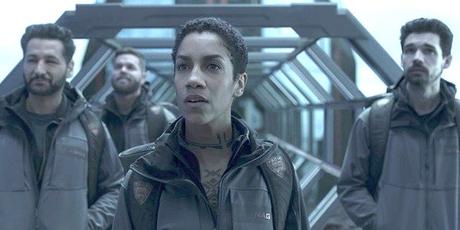
The Expanse - 4x01 New Terra.
Previously on The Expanse, James Holden inadvertently (which is the way in which he mostly does things) opened a ring network to the rest of the universe. This network of over 1,300 gateways to galaxies far away was built by a civilization that has been wiped out, along with several other systems beyond the gate, by an unknown force. The Expanse's third season now reckons with the political and social implications of so many possible new worlds ripe for the discovery, as well as the question of whether the same threat that destroyed the original creators still looms. To understand one of the main implications of the gates opening, it is important to remember the socio-economic situation of the Belters, who have been exploited as an expendable and cheap working class by both the U.N. and the Martian Congressional Republic. They provide cheap labor for the two competing forces, which has created deep resentment against the "Inners" and several ideologically diverse groups claiming to represent Belter interest, which range from merely political to violent. Earth is defined by both its political dominance and the fact that most of its remaining inhabitants cannot find work on the planet, since the focus of industry and production has moved to the outer regions of the galaxy - consequently, a significant proportion of citizens subsides on Basic Assistance, which is the reason why both Belters and Martians look down on Earth inhabitants. Mars has been colonised, but programmes to fully terraform the planet into a habitable environment are slow, which is why Martian life exists underground. Martian society is based on everybody contributing to the greater cause of terraforming the planet, but with so many possible new planets out there which may already have a breathable atmosphere and arable land, Mars is faced with an identity crisis.
In short, many individuals - refugees from the many protomolecule-related catastrophes of the last few years, prospectors looking for an adventure and gold, Belters eager to live far away from the influence of the Inners, Martians who want to breathe fresh air, and many more, are eager to go through the ring gates to discover new worlds. Holden and ever far-seeing UN Secretary-General Chrisjen Avasarala knew this was coming, and created an ad-hoc system of control to govern who gets to traverse the gates, with the help of former Belter radicals, the Outer Planets Alliance, policing the ships traveling through the gates and combatting piracy. This unfortunately sometimes means that former allies find themselves forced to fire on ships filled with refugees, or other Belters, creating a heated political climate, and regardless of the attempted tight control, people are desperate enough to make their way to freedom regardless.
One such group of successful Belters and prospective colonists settles on Ilus after making a run through the gate. This inconveniences Earth, which is eager to give mining rights to treasures of lithium away, and decides to send a mission of scientists and military there to establish that the Belters do not own what they have settled (under the guise of a merely scientific mission, but it becomes clear even in this first episode that Murty is there to take mining rights from the settlers at whatever cost). Chrisjen sends Holden and the Rocinante to Ilus both because she is concerned about the mission and because of the massive constructions looming over the settlement, which look a lot like something the protomolecule may have built. The most interesting moment in this first episode in which the Rocinante sets out for another mission of adventure, with Miller in tow to forever investigate what destroyed his creators (he is trapped in a loop, incapable of moving on until Holden has taken him to find the next clue), is a conversation between Naomi and friend/possible ex-lover Camina Drummer, who runs the only gas-refuelling station next to the ring gate: they discuss the merit of wanting to settle on a planet that has free air and water vs. the essential nature of Belters, who were born and live in space, whose bodies are not made to live downwell (Naomi has to undergo a gruelling course of injections to prepare for gravity). Drummer knows what the discovery of the new planets means: the way Belters have lived is under threat, because soon, these planets will be settled, and even if this generation struggles, and many can't make it down to the surface, their children and children's children will forget what it means to live in space. Their bodies will adapt to planetary life, and Belter culture will be forgotten by history. And Naomi is eager for this life, because she has only seen it through a communications screen - Holden, with his big family, down on Earth, while she couldn't make it. It's an existential question of what it means to live a life that may be a sidenote in history down the line.
Bobbie, meanwhile, does manual labor back at Mars - a hero, who like all Martians must continue to contribute now that she is no longer a Sergeant. And true to her character, she has a much more cynical view of exploration and settlement: she knows that none of this will be peaceful, that it is only a question of time before she will have to put her uniform back on. Colonisation was never peaceful, and this won't be any different: before the scientific mission to Ilus lands, it is hit by some kind of human- or non-human made catastrophe, and comes down crashing, leaving a trail of dead bodies behind. It's already started.

